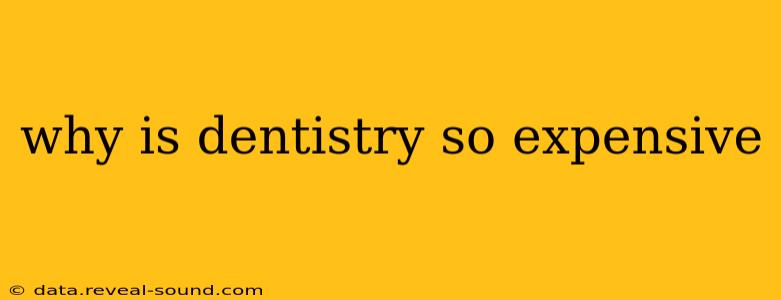Dental care, unfortunately, often comes with a hefty price tag. Many people wonder why dental procedures seem so expensive compared to other medical services. The answer isn't simple, but it involves a complex interplay of factors. Understanding these contributing elements helps explain the high cost of dentistry and allows patients to make more informed decisions about their oral health.
What Makes Dental Costs So High?
Several key factors contribute to the high cost of dental care:
1. High Education and Training Costs:
Becoming a dentist requires years of rigorous education and training. Dental school is expensive, and students often accumulate significant debt. This debt, coupled with the high cost of establishing and maintaining a practice, ultimately impacts the fees dentists charge patients. The extensive specialized training required for various procedures, such as orthodontics or implantology, further adds to the overall cost.
2. Advanced Technology and Equipment:
Modern dentistry relies on advanced technology and equipment, including sophisticated imaging systems (like digital X-rays and CBCT scanners), lasers, and CAD/CAM (computer-aided design/computer-aided manufacturing) systems for creating crowns and restorations. This equipment is costly to purchase, maintain, and upgrade, contributing to increased overhead costs.
3. Materials and Supplies:
Dental materials and supplies are not cheap. High-quality materials are essential to ensure the longevity and effectiveness of dental treatments. The cost of materials like crowns, fillings, implants, and other restorative materials significantly impacts the overall price of dental procedures.
4. Insurance Coverage and Reimbursement Rates:
Dental insurance plans, unlike many medical insurance plans, often have lower reimbursement rates for dentists. This means dentists receive less money per procedure from insurance companies, forcing them to charge higher prices to cover their costs. The complexities of navigating insurance claims also add to administrative overhead.
5. Practice Overhead Costs:
Running a dental practice involves significant overhead expenses. These include rent or mortgage payments, utilities, staff salaries, marketing and advertising, and malpractice insurance—all of which contribute to the overall cost of care. The size and location of the practice can also significantly impact these overhead costs.
Why are Specific Procedures So Expensive?
Many people question the cost of specific procedures. Let’s address some common queries:
Why are dental implants so expensive?
Dental implants are a complex and multi-stage procedure requiring specialized expertise, advanced technology, and high-quality materials. The process involves surgical placement of the implant, bone grafting (in some cases), and the creation and placement of the abutment and crown. The longevity and functionality of the implant, however, often justify the higher cost in the long run.
Why are crowns so expensive?
Dental crowns require precise fabrication using high-quality materials that are designed to withstand the forces of chewing and biting. The materials used, the laboratory fees for fabrication, and the dentist's expertise and time contribute to the overall cost. The type of crown material (porcelain, gold, etc.) also impacts the price.
Why are teeth whitening treatments so expensive?
Professional teeth whitening treatments use specialized materials and techniques to achieve optimal results while protecting the enamel. The cost includes the professional time and the materials used, including the whitening agents, protective barriers, and potentially custom trays.
How Can I Reduce Dental Costs?
Several strategies can help manage dental costs:
- Preventive Care: Regular checkups and cleanings can prevent problems from escalating into more expensive treatments.
- Dental Insurance: Consider purchasing a dental insurance plan to help offset the cost of procedures.
- Negotiate Payment Plans: Discuss payment options and payment plans with your dentist.
- Shop Around: Compare prices from different dental practices in your area.
- Consider Alternative Treatment Options: Discuss less expensive alternatives with your dentist when appropriate.
Ultimately, the high cost of dentistry is a reflection of the extensive education, advanced technology, and high-quality materials involved. By understanding these factors, patients can make informed decisions about their oral health and work with their dentists to manage the costs effectively. Prioritizing preventative care remains the most effective strategy to minimize long-term dental expenses.
